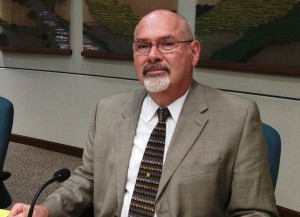If you doubt that state authorities were wrong in fining the Albany city manager for a press release about last fall’s city bond election, read the state’s own legal brief and your doubts will vanish. The state’s brief claims that Wes Hare violated the election law by making an impartial statement, but the facts and what the law actually says make it plain that he did no such thing.
City Attorney Jim Delapoer is contesting the state’s penalty at no additional cost to the city on the grounds that an important principle — the right to write and speak freely “on any subject whatever” as guaranteed in the Oregon constitution — is under attack and needs defending. He and his associate, Sean Kidd, have written a response to the state’s motion to have the case decided for the state without a hearing. It’s an excellent response, but non-lawyers can reach the right conclusion without it just by reading the state’s own motion for a “summary determination.”
Here’s my take: The law is intended to prevent electioneering on the public’s dime. In its pertinent part the law says: “No public employee shall … promote or oppose … the adoption of a measure … while on the job during working hours. However, this section does not restrict the right of a public employee to express personal political views.”
What Hare had done, in line with a directive from the city council, was to issue a press release announcing that the council had voted to form a citizens committee to review the construction projects then being proposed. The press release concluded with this reminder: “Voting is under way on a 20-year general obligation bond measure that would provide $20.3 million to be used to replace both the Albany Fire Station 11 and the Albany Police Department building. The election ends November 5, 2013.”
The state wants to penalize Hare based on a manual purporting to explain what the law means. The manual says that in order to be impartial, material issued by public officials in regard to bond elections must include “the cost of the measure to an individual taxpayer or consumer. … In the context of a bond levy, this is generally the cost per $1,000 of assessed value. The cost must not be worded in a way to minimize it.”
As a law based on which citizens who are public officials may be threatened with punishment, this is so imprecise as to be laughable. How can anyone know in advance whether an official at the Oregon Elections Division in Salem will think any wording “minimizes” the cost? And what is the “cost”? The proper term here is the “tax rate,” which will have a different cost effect on people based on their circumstances.
What about the manual’s reference to “consumers”? What consumers? How can anyone tell how an estimated tax rate affects consumers?
In short, the state relies on an administrative rule in the form of a manual written as a guide, but this guide goes far beyond the law itself and veers off into vague concepts such as the cost for consumers, concepts that public officials faced with communicating with the public are supposed to divine the meaning of. And if they get it wrong, they might be branded as law violators.
Back to the facts: The law properly prohibits public officials from promoting or opposing ballot measures with public money and on the public’s time. Read the press release again. It promotes nothing. It opposes nothing. It reports a council action. It reminds people of an election. It says when the election ends. The state, citing a vague administrative rule, claims the press release was illegal advocacy. In this case, as the law itself and the facts prove, the state has no case. (hh)





The facts actually support the state’s case. Before releasing the press release Hare could have easily consulted the clear and specific limitations contained in Oregon rules. He could have easily asked the city attorney to review the press release. He could have easily accessed the review services of the Elections Division.
He did none of this, while at the same time admitting that the press release he wrote was an expression of his own political views. It seems incredible that the city manager is now surprised that consequences flow from political behavior.
There is a simple solution here. In the future the city council should write and release its own press releases.
This responsibility should not be delegated to on-the-job public employees who then use work time to engage in activity outside their official role. Let’s keep political spin contained to elected officials.
Well, he could have done those things. In regimes where speech is controlled, officials who want to stay out of the Gulag do just that by running their output through the censor. But in a society with the First Amendment of the U.S. Bill of Rights and with Article 1, Section 8 of the Oregon constitution, why should it be necessary? The law is clear: No promoting or opposing on public time. As long as officials do neither, as in this case, there is no reason to complain. (hh)
“The law is clear: No promoting or opposing on public time. As long as officials do neither, as in this case, there is no reason to complain.”
Well, that is the crux of the matter and why we have a legal process. Some of us think Hare’s impartiality constituted advocacy.
After reading both the state’s Motion for Summary Determination and the city’s response, it seems clear to me that Delapoer expects to lose at the OAH level and wants this case heard at the Court of Appeals and then the Oregon Supreme Court. This could take a while.
And, please, stop with the Gulag references. It demeans the process and the issues under review.
OK, but when “impartiality constitutes advocacy,” we’re deep in Wonderland and somebody has to point the way out, even if it takes outlandish exaggeration. (hh)
Regardless of how long it may take, it is a serious point that needs to be adjudicated. The city walked away from doing same vis-a-vis the “electors” issue awhile back. That one too needs to go through this same process at some point down the road…
Sorry, I should have said “partiality”, not “impartiality.” Hare admitted essentially the same when we acknowledged that his press release was an expression of his political views.
“He” acknowledged, right? But what he acknowledged in the filing before the state administrative law judge was not “partiality” but that the wording in the press release was his, meaning it is protected by the stature’s provision that employees are free to express their personal political views. (hh)